- Home
- M. K. Hume
Prophecy: Death of an Empire: Book Two (Prophecy Trilogy) Page 11
Prophecy: Death of an Empire: Book Two (Prophecy Trilogy) Read online
Page 11
‘You, Cleoxenes, have seen the Hungvari, whom you call the Hun. Your master, Theodosius, paid a huge ransom to protect his lands from pillage during their inexorable march to the west. Never fear! Constantinople will stand long after Rome, Ravenna and all their works are pale memories of ruined columns and shattered temples. The walls will stand and a great church will rise beyond the winds of time and war, but the Golden Horn will see you washed away by the scimitar. Remember me, Cleoxenes, when I come to your halls.’
Cleoxenes took an involuntary step forward, but Myrddion had already turned on legs that were incapable of bending. The emissary swore in perfect Latin, its purity rendered shocking by the crudity that spilled uncensored from his lips. Then Cleoxenes crossed himself once more, and his lips moved in either silent prayer or an incantation of a charm against evil.
Within the halls of Merovech, Myrddion’s ragged breathing was the only sound that broke the stillness. Then, just as the king stirred, preparing to speak, the healer gave a great cry, his eyes closed and his knees collapsed under him. His head struck the floor with a sharp crack and a trickle of blood snaked over the tiles.
‘Then my master ordered me to bind your head wound, and lodge you in one of the guest chambers,’ the servant finished. ‘As you can see, I carried out his instructions.’
Myrddion was exploring the back of his skull where a small dressing covered a long split in the skin. ‘You are an accurate and talented storyteller, Castor. I could almost see the audience chamber as you spoke. Thank you for caring for me. Unfortunately, I have no idea what much of the prophecy means. I suppose my words were the ramblings of delirium.’
Flavia had listened by the far wall where the shadows hid the expressions that passed over her mobile features, but as Castor left the room she moved forward into the light. ‘Are any of your prophecies the truth, or simply the ramblings of a brain-sick dolt?’ she asked, her face as stiff as a marble effigy.
‘How can I say, my lady? I never remember what I have said after these fits take me. Nor do I court such visions. Merovech and Aetius forced me to speak or to face death. I am neither brain-sick nor foolish, and desire nothing more than to travel to Ravenna in peace. Regarding fratricide and vultures, I am as puzzled as you are.’
Flavia laughed softly, but her mirth had no humour in it. ‘If Castor has recounted your words accurately, those references were clear for any Roman to understand. Surely you know the tale of Romulus and Remus?’
‘They were the twins who founded Rome,’ Myrddion answered blankly. ‘I’m sorry, mistress, but I still don’t understand.’
‘Romulus slew his brother and was then granted a vision by the gods. He dreamed of twelve vultures that symbolised the ages that Roman power should endure. Aye, the best part of twelve centuries has passed since Romulus became a fratricide, and the soothsayers look for signs that the end of the Empire is coming.’
Flavia was so serious and so perturbed that Myrddion had to stifle a laugh. ‘I see the reference to vultures, but what has Romulus to do with Attila? My words were ravings – they were of little relevance.’
‘No! For pious Romans will tremble at the words of your prophecy. I am adept at listening at closed doors when my father entertains, so I can relay the news that Attila has killed his brother, Bleda. Just as Romulus slew Remus to purchase Rome’s twelve centuries of power, Attila has begun to create a myth for his own purposes. Why, I cannot imagine, for I am a mere woman, but my father sits alone on the terrace and broods over your prophecy, because you knew the greatest fear that assails Valentinian, emperor of the Western Empire.’ Then she laughed, a sound reminiscent of the tinkling of bells. ‘Ah! Perhaps you’re no dolt at all, but a man who weaves the skeins of power and chance into a rope that will bind even the greatest men of the west to protect you. Perhaps you’re worth my cultivation.’
She would have continued, but Castor returned to the room on silent feet and took the beaker from Myrddion’s unresisting fingers.
‘Lord Aetius bade me to inform you, healer, that you are now in the employ of King Merovech, who has welcomed your prophecy. When you are fully recovered, you are instructed to make yourself ready for departure to an undisclosed destination. General Aetius would also be obliged if you would refrain from being in his presence from this day onward.’
‘My thanks to your master, Castor, but I don’t intend to serve the king of the Salian Franks,’ Myrddion snapped with a sudden flush of temper on both cheekbones. Avoiding the servant’s eyes, he sat up gingerly and swung his feet to the floor.
‘My master expected such a response, so a guardsman will ensure that you obey his instructions. Your prophecy is dangerous to both Merovech and Aetius, for Attila would use it to convince the gullible and the superstitious that the Roman Empire is doomed. When you leave this room, you will be escorted back to the guardhouse. I might add that Aetius implied that your apprentices and your servants will be held hostage to ensure your co-operation.’
‘Shite!’ Myrddion swore pungently in soldier Celt. Flavia laughed throatily, although how she could understand his crudities baffled the young healer. ‘That being the case, I will take my leave,’ he added stiffly. ‘My apologies, mistress, if my prophecies caused you pain.’ He sketched a rudimentary bow in Flavia’s direction and limped to the door, boots in hand.
The audience was over.
When Myrddion entered the upper room of the guardhouse, accompanied by a very large and humourless Frankish warrior, five pairs of worried eyes looked up with varying degrees of surprise and pleasure.
‘You live, master!’ Cadoc exclaimed joyously, leaping to his feet and embracing the healer.
‘You state the obvious, Cadoc. Have you heard our orders?’
‘Aye, master,’ Finn Truthteller said, rising slowly to examine his lord’s bandaged head. ‘Until we received them, we feared we would never see you again.’
‘Then you know we must pack and be prepared for an immediate departure?’
‘Aye. The preparations are already complete and we were awaiting you, my lord,’ Cadoc explained, his eyes shining with relief. ‘That Merovech moves fast when he chooses, and all that needs doing is to put the horses in the traces.’
‘I’m sorry that we are brought to this pass through my affliction. With luck, Merovech will release us when the Hun is forced to retreat to the lands from whence he came. I hunger already to be free of Aetius and the allied kings.’
‘At least you’re alive, Master Myrddion,’ Finn responded quietly. ‘I never saw the like of your trance, and I never wish to see it again. I have never felt such terror as when you defied the general and told him that he was bringing his assassination down on his own head. I was sure we’d all be killed out of hand.’
Myrddion grimaced and anger stirred in his gut, like the sick feeling caused by sour wine. ‘Perhaps our new masters are honourable men. Perhaps they’re not. Only time will expose the truth. Meanwhile, Merovech, Aetius and the tribal kings intend to go to war, so there’ll be red work for us to labour at. I would have wished for a better outcome, but beggars cannot be choosers and the general holds our lives in the palms of his hands.’
Once Truthteller was satisfied that Myrddion had suffered no lasting hurt, the party trooped down the stairs and waited while the ostlers led the unprotesting horses into the traces and secured their harnesses before climbing into the heavy wagons. The Frankish guardsmen were already mounted on large, skittish horses, but the entire group was forced to wait for nearly an hour until Merovech, his son and a contingent of the king’s personal guard joined them. The warriors were immaculate, and even Gwylym had polished his plated leather cuirass until the embossed and engraved brass shone like gold.
By comparison with his men, Merovech was a subdued figure. His cuirass was obviously Roman in style, including the plated leather skirts that protected his loins and flanks. The king could have indulged his vanity with gilding, but heavy iron served him well enough without the need for oste
ntatious finery. A shirt of fine metal links protected his upper arms under the cuirass and greaves of iron were strapped over his leather breeches.
Only his horseflesh indicated his station. His mount was a showy grey whose dappled coat shone with grooming, its fine hocks lacking the fringe of long hair usually associated with horses of such great size and strength. The harness too was workmanlike but heavily decorated with rosettes of brass and bronze.
Merovech glanced across at Myrddion on the high seat of the wagon. His saturnine face creased into a grin of recognition and pleasure.
‘Well, healer, you’re still with us, although the night has almost fled while we awaited your recovery. The allied army is advancing, exactly as you predicted. Aetius will lead the legions, the Alans and the Burgundians to block Attila should he try to retreat. To the Franks and the Visigoths is allotted the privilege of lifting the siege of Aurelianum. The old Roman name for the city is rarely used now, for most folk call it Orléans. Have you heard of it?’
‘Aye, my lord. I have heard of Aurelianum, although I didn’t know it was besieged. We would have stumbled into a hornets’ nest of Hun cavalry had your noble son, Childeric, not brought us to you.’
Merovech chuckled. ‘True, healer! And think what we’d have lost, if Childeric had not been such a clever servant of his father. I’d never have heard you prophesy, Demon Seed, and I’d have been the poorer for that silence. Where we are going, your expertise will be needed, for your prophecy of blood is about to come true. By the way, couriers have arrived to warn us that King Theodoric plans to join us at Aurelianum.’
Myrddion blinked in surprise. ‘Why would the emperor of the Eastern Empire at Constantinople come here, my lord? I don’t understand.’
Merovech chuckled and slapped his thigh so hard that his grey stallion danced and pulled at the reins, its eyes wide with nervousness. ‘Your face! You’re confused, young man, for this Theodoric is the king of the Visigoths and rules vast lands to the south and onwards into Hispania. He’s not the eastern emperor, although they do have similar names. No doubt King Theodoric’s father had great ambitions for his son.’
Myrddion flushed with embarrassment. ‘I will pray for the king’s safety then,’ he answered evenly, although his heart sank. ‘I’ve been informed that part of my prophecy concerns the death of a great ruler, although I have little knowledge of the Visigoth tribe.’
‘Theodoric and his warriors are our greatest and most valued allies. Without them, Attila will strip Gaul bare and turn us into more of his vassals.’ Merovech looked glum for a moment but his natural ebullience quickly reasserted itself. ‘The levies have been ordered into the battle lines, but for the moment Aurelianum is our target, as you suggested. We ride in haste, following Aetius, who has already departed with the legions. May the gods keep you safe, healer, for you are of vital importance to our plans.’ Then, with an imperious wave of his hand, Merovech and his guard clattered away into the fraying darkness that was fast retreating before another clear morning.
The countryside west of Châlons was beautiful, and for the first time Myrddion relaxed on the high seat of the wagon and enjoyed the panorama around him. In the distance, a cloud of dust indicated that a large force of cavalry and foot soldiers was on the move. Long rows of poplars grew like golden-green fingers, pointing upwards into the vivid morning sky. The land was rich and civilised but empty, for the peasants had disappeared with the first signs of imminent warfare.
The wagons were, perforce, much slower-moving than the mobile contingents of cavalry and foot soldiers that passed them on the road leading westward to Aurelianum. To protect the small convoy from any groups of marauding Huns, Merovech had ordered a detachment of Frankish cavalry to accompany the healers, and, with pleasure, Myrddion recognised Captus leading the guard. When they paused at dawn to water the horses, Myrddion beckoned the large, rawboned Frank to join him.
‘I haven’t forgotten that tooth of yours, Captus. I’ll see to drawing it when we rest for the night. Does it pain you?’
The warrior shifted uneasily on his saddle, and Myrddion recognised the anxiety in his eyes. No matter how courageous they were, most men feared the extraction of teeth more than the pain from the diseased tooth itself.
‘Aye, it does. But I have no wish to miss the siege of Aurelianum because of a toothache.’
‘All the more reason why it should be drawn before the infection poisons your blood.’ Then Myrddion grinned engagingly, having divined Captus’s real source of discomfort. ‘Don’t be concerned, Captus, for I’m not a sorcerer or a demon who will attempt to ensnare you with spells. I’m a healer, and I know that a man with a bad toothache is not effective in the field. A little pain now will save greater agonies later.’
‘I’m not afraid of having a tooth pulled out,’ Captus snapped, his manhood insulted by Myrddion’s slur on his courage.
‘Good! Then I’ll see you at dusk, good master Captus.’
Cadoc flicked the reins on the flanks of the sturdy carthorses and the journey recommenced.
At dusk, on the banks of a slow-flowing stream, Captus arrived at the wagons like a prisoner being led to execution. The Frank didn’t exactly drag his feet but his bowed shoulders and haunted eyes showed his reluctance to endure the treatment more clearly than mere words. Hiding a smile, Myrddion presented the Frankish warrior with a cup of wine into which he had poured a few drops of poppy juice.
‘You need not distrust my potion, Captus, for I have no need for poisons. This draught will simply dull the pain and ensure that you sleep soundly after the extraction. Now Finn and Cadoc will hold you still. Sit yourself down on this stool.’
Captus endured the extraction like a true warrior, although his eyes grew round with apprehension when he saw the size of Myrddion’s surgical pliers. Fortunately, the rotten tooth did not splinter and break off in their grip, so Myrddion was not obliged to cut into the gum to remove the root. With a sudden gush of blood, the canine pulled free and the young healer pressed a clean pad of cotton over the empty socket.
‘Swill your mouth out with a beaker of water to which you’ve added a handful of salt. The saline will keep the wound clean until it closes in a few days’ time. A glass or two of wine wouldn’t hurt either, as long as you rinse your mouth afterwards.’
Captus gazed up at the healer from his stool, his expression one of exquisite relief.
‘My thanks, Master Myrddion, for my mouth scarcely hurts at all. Salty water? Well, who’d have thought such a common thing would be a cleanser? Aye, I’ll follow your advice.’
For three more days, the healers and their escort travelled the road leading to Aurelianum, while smoke on the horizon suggested that a pitched battle was being fought somewhere ahead of them. On the morning of the fourth day, with Aurelianum almost in view, a huge cloud of dust to the north spoke mutely of the movement of a huge contingent of horsemen.
‘Hun or Frank?’ Cadoc asked, but Myrddion shrugged. They could only discover what was happening by reaching Aurelianum at speed. For the first time, Myrddion grew impatient at the slow pace of the wagons, for his vanity made him curious about the accuracy of his predictions.
Aurelianum appeared out of a haze of thick black smoke as the noonday sun dazzled the healers’ eyes. A fair-sized city, situated at the confluence of rivers on a wide green plain, it had been besieged for over two weeks, but its walls were strong and water was plentiful within their confines. More important, its citizens knew what fate awaited them if they were defeated, whether they fought or surrendered, and the knowledge stiffened their spines. A large contingent of Salian Franks was also trapped within Aurelianum’s walls, and the presence of these trained fighting men gave heart to the populace. For the first time, Attila faced a determined, well-trained and entrenched enemy.
Outside the walls, Myrddion saw the remains of a large encampment where many thousands of cavalry had left scarred sod and the dung, detritus and dead cooking fires of a force that had settled in fo
r a protracted siege. His eyes swept across the huge swath of damage caused by the long picket lines of an army that easily outnumbered the forces available to Merovech and Aetius.
As he stared down the roadway, he saw plentiful evidence of a hasty departure. Off to his right, a series of cooking hearths still held iron pots hanging over simple tripods. No warrior would willingly abandon such essential tools of a cavalryman’s life. Squinting against the glare, Myrddion could see a wide slash of churned earth where many mounted men had formed up and departed for the northeast. It required very little imagination to picture the hasty collection of food and fodder bags that could be slung quickly over saddles. Yet, for all the speed that was evident in every foot- and hoof-print, the retreat had been disciplined and orderly.
The Huns had finally gained entrance to the city through the use of a battering ram, but the Salian Franks and the Burgundians had counter-attacked while the Hun warriors were trapped within the town’s streets and alleyways. This time, fully trained warriors had been committed to the battle, instead of the women, children and old men who had defended the towns that fell to Attila’s forces earlier in the campaign. Aurelianum was no Cambrai that would make a token effort to protect itself. Aurelianum knew that defeat would result in an ugly death.
A vicious, hard-fought battle had ensued, although the Franks lacked the numbers to crush the Hun horde totally. After fierce hand-to-hand fighting through the narrow lanes of the city, the greater part of Attila’s force managed to escape their entrapment. Then, a highly disciplined and dangerous force once more, they made a strategic retreat to the east to link up with the other half of Attila’s army who had taken the towns of Treviri, Divodunum, Reims and Worms. Somewhere north of Châlons, Attila, the Dread of the World, now waited to meet the armies of Aetius.

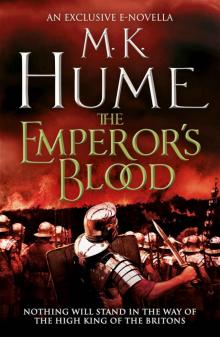 The Emperor's Blood (e-novella)
The Emperor's Blood (e-novella)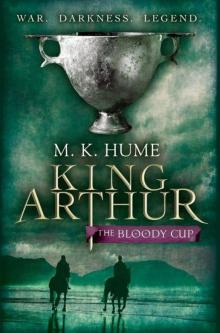 King Arthur: The Bloody Cup: Book Three
King Arthur: The Bloody Cup: Book Three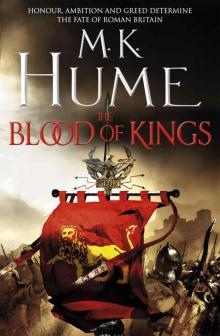 The Blood of Kings: Tintagel Book I
The Blood of Kings: Tintagel Book I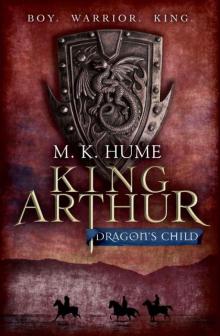 King Arthur: Dragon's Child: Book One (King Arthur Trilogy 1)
King Arthur: Dragon's Child: Book One (King Arthur Trilogy 1)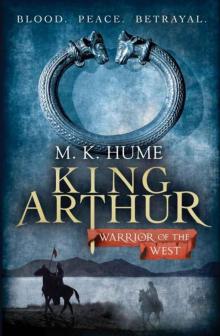 King Arthur: Warrior of the West: Book Two
King Arthur: Warrior of the West: Book Two The Storm Lord
The Storm Lord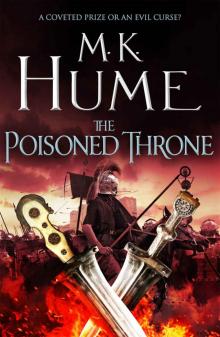 The Poisoned Throne: Tintagel Book II
The Poisoned Throne: Tintagel Book II![M. K. Hume [King Arthur Trilogy 04] The Last Dragon Read online](http://i1.bookreadfree.com/i2/04/07/m_k_hume_king_arthur_trilogy_04_the_last_dragon_preview.jpg) M. K. Hume [King Arthur Trilogy 04] The Last Dragon
M. K. Hume [King Arthur Trilogy 04] The Last Dragon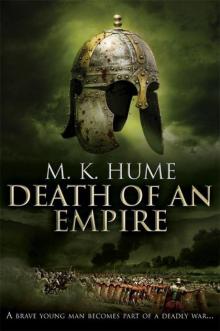 Prophecy: Death of an Empire: Book Two (Prophecy Trilogy)
Prophecy: Death of an Empire: Book Two (Prophecy Trilogy)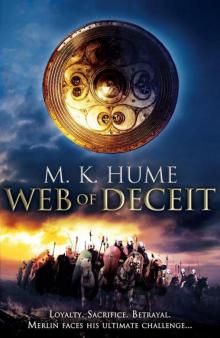 Prophecy: Web of Deceit (Prophecy 3)
Prophecy: Web of Deceit (Prophecy 3)